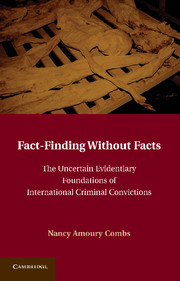 Fact-Finding without Facts
Fact-Finding without Facts Book contents
- Frontmatter
- Contents
- Acknowledgments
- Introduction
- 1 The Evidence Supporting International Criminal Convictions
- 2 Questions Unanswered: International Witnesses and the Information Unconveyed
- 3 The Educational, Linguistic, and Cultural Impediments to Accurate Fact-Finding at the International Tribunals
- 4 Of Inconsistencies and Their Explanations
- 5 Perjury: The Counternarrative
- 6 Expectations Unfulfilled: The Consequences of the Fact-Finding Impediments
- 7 Casual Indifference: The Trial Chambers' Treatment of Testimonial Deficiencies
- 8 Organizational Liability Revived: The Pro-Conviction Bias Explained
- 9 Help Needed: Practical Suggestions and Procedural Reforms to Improve Fact-Finding Accuracy
- 10 Assessing the Status Quo: They Are Not Doing What They Say They Are Doing, but Is What They Are Doing Worth Doing?
- Conclusion
- Bibliography
- Index
- References
3 - The Educational, Linguistic, and Cultural Impediments to Accurate Fact-Finding at the International Tribunals
Published online by Cambridge University Press: 05 October 2010
- Frontmatter
- Contents
- Acknowledgments
- Introduction
- 1 The Evidence Supporting International Criminal Convictions
- 2 Questions Unanswered: International Witnesses and the Information Unconveyed
- 3 The Educational, Linguistic, and Cultural Impediments to Accurate Fact-Finding at the International Tribunals
- 4 Of Inconsistencies and Their Explanations
- 5 Perjury: The Counternarrative
- 6 Expectations Unfulfilled: The Consequences of the Fact-Finding Impediments
- 7 Casual Indifference: The Trial Chambers' Treatment of Testimonial Deficiencies
- 8 Organizational Liability Revived: The Pro-Conviction Bias Explained
- 9 Help Needed: Practical Suggestions and Procedural Reforms to Improve Fact-Finding Accuracy
- 10 Assessing the Status Quo: They Are Not Doing What They Say They Are Doing, but Is What They Are Doing Worth Doing?
- Conclusion
- Bibliography
- Index
- References
Summary
Chapter 2 amply demonstrates that many witnesses at the ICTR, SCSL, and Special Panels fail to answer basic questions that are central to the witness's account of the events witnessed. This chapter considers why those questions do not get answered. The most obvious explanation, and the one the witnesses themselves most frequently invoke, is the witnesses' lack of education. Cultural factors provide another plausible reason for many communication difficulties, as do interpretation errors. The following sections will discuss each of these causes.
EDUCATION, LITERACY, AND LIFE EXPERIENCES
Fact witnesses are expected to recount their firsthand experiences that are relevant to the charges brought against the defendant. In the Western countries from which international criminal procedures derive, it goes without saying that fact witnesses have the ability to convey such information. Indeed, while a great deal of Western scholarship focuses on perjuring witnesses or witnesses whose testimony is impaired by errors of perception or memory, it is taken for granted that witnesses have the education and skills necessary to convey what they witnessed in a reasonably clear and coherent way. Indeed, it is only in the context of children's testimony that one generally finds any discussion of the assumptions on which witness testimony is based. Speaking in relation to child witnesses, for instance, Ingrid Cordon and her coauthors observe that adversarial legal systems in particular hold many implicit expectations of witnesses, including that witnesses have “some knowledge of judicial processes [and] can understand the language of the courtroom, particularly attorneys' questions.”
- Type
- Chapter
- Information
- Fact-Finding without FactsThe Uncertain Evidentiary Foundations of International Criminal Convictions, pp. 63 - 105Publisher: Cambridge University PressPrint publication year: 2010


